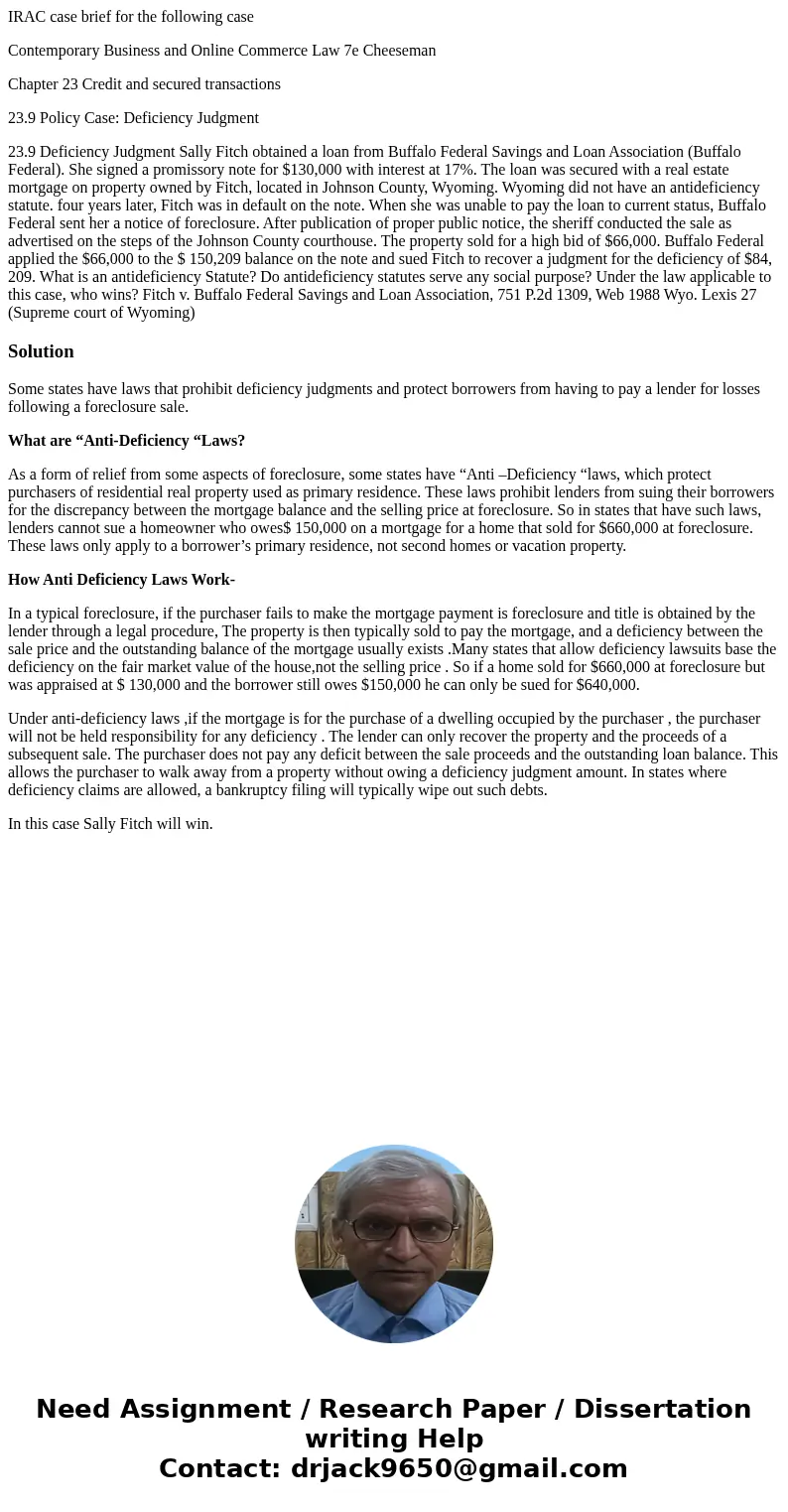IRAC case brief for the following case Contemporary Business
IRAC case brief for the following case
Contemporary Business and Online Commerce Law 7e Cheeseman
Chapter 23 Credit and secured transactions
23.9 Policy Case: Deficiency Judgment
23.9 Deficiency Judgment Sally Fitch obtained a loan from Buffalo Federal Savings and Loan Association (Buffalo Federal). She signed a promissory note for $130,000 with interest at 17%. The loan was secured with a real estate mortgage on property owned by Fitch, located in Johnson County, Wyoming. Wyoming did not have an antideficiency statute. four years later, Fitch was in default on the note. When she was unable to pay the loan to current status, Buffalo Federal sent her a notice of foreclosure. After publication of proper public notice, the sheriff conducted the sale as advertised on the steps of the Johnson County courthouse. The property sold for a high bid of $66,000. Buffalo Federal applied the $66,000 to the $ 150,209 balance on the note and sued Fitch to recover a judgment for the deficiency of $84, 209. What is an antideficiency Statute? Do antideficiency statutes serve any social purpose? Under the law applicable to this case, who wins? Fitch v. Buffalo Federal Savings and Loan Association, 751 P.2d 1309, Web 1988 Wyo. Lexis 27 (Supreme court of Wyoming)
Solution
Some states have laws that prohibit deficiency judgments and protect borrowers from having to pay a lender for losses following a foreclosure sale.
What are “Anti-Deficiency “Laws?
As a form of relief from some aspects of foreclosure, some states have “Anti –Deficiency “laws, which protect purchasers of residential real property used as primary residence. These laws prohibit lenders from suing their borrowers for the discrepancy between the mortgage balance and the selling price at foreclosure. So in states that have such laws, lenders cannot sue a homeowner who owes$ 150,000 on a mortgage for a home that sold for $660,000 at foreclosure. These laws only apply to a borrower’s primary residence, not second homes or vacation property.
How Anti Deficiency Laws Work-
In a typical foreclosure, if the purchaser fails to make the mortgage payment is foreclosure and title is obtained by the lender through a legal procedure, The property is then typically sold to pay the mortgage, and a deficiency between the sale price and the outstanding balance of the mortgage usually exists .Many states that allow deficiency lawsuits base the deficiency on the fair market value of the house,not the selling price . So if a home sold for $660,000 at foreclosure but was appraised at $ 130,000 and the borrower still owes $150,000 he can only be sued for $640,000.
Under anti-deficiency laws ,if the mortgage is for the purchase of a dwelling occupied by the purchaser , the purchaser will not be held responsibility for any deficiency . The lender can only recover the property and the proceeds of a subsequent sale. The purchaser does not pay any deficit between the sale proceeds and the outstanding loan balance. This allows the purchaser to walk away from a property without owing a deficiency judgment amount. In states where deficiency claims are allowed, a bankruptcy filing will typically wipe out such debts.
In this case Sally Fitch will win.

 Homework Sourse
Homework Sourse